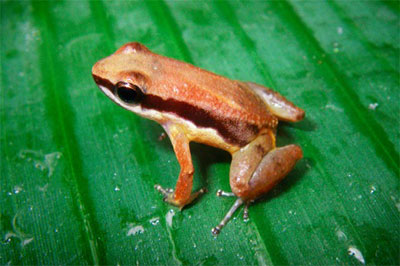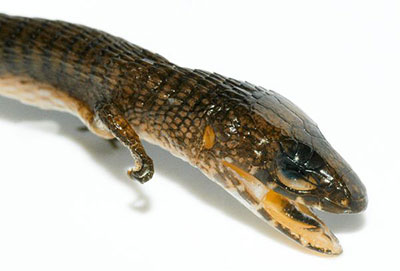GUYANA is a biodiversity rich country. An estimated 8,000 species of plants and 1,800 species of amphibians, birds and mammals (Guyana’s Fourth National Report to the

Convention on Biological Diversity (2010) can be found here. Our highly forested land area has served to keep much of our biodiversity untouched. However, because our biodiversity is highly understudied, gaps in information exist. Among the factors that have contributed to the lack of studies on our biodiversity are in- accessibility and high cost to gain access to
our hinterland. Despite this, new discoveries are made from time to time of new species right here in Guyana! Among some new species discovered over recent years are:
Carapa akuri – a tree species belonging to the Mahogany family (Meliacea). It is considered to be endemic to Central Guyana. The specific nickname akuri is used by the Macushi tribe as a name for the red-rumped agouti, which is likely the main seed disperser of Carapa in Guyana.
Gonatodes timidus – a new species of lizard. Research done, found that this lizard is currently found only at the base of the Iwokrama Mountains. Intensive surveys in several surrounding areas have never recorded a species

matching this description, and it may well be endemic to the Iwokrama Mountains. The specific name is derived from the Latin adjective timidus meaning “shy” or “fearful”. It refers to the tendency of individuals of this species to avoid being seen by hastily escaping between rocks, making them very difficult to collect.
Microcaecilia iwokramae (Caecilita iwokramae) ? a new genus and species of the9 lung-less caecilian.

The single known specimen was found in mixed low-stature scrub forest on high hills. Although its ecology is poorly known, it is presumed to be a terrestrial species, as are other members of the Caeciliidae family, and to breed by either laying eggs on land or by direct development. Specimens could be found by digging soil, particularly under rotting wood or leaf litter or between the buttress roots of trees.
Allobates amissibilis – a new species of frog named – Latin for “that may be lost” in recognition of its home, which was the setting for British author, Sir Arthur Conan Doyle’s 1912 book, The Lost World. The frog was discovered near Turu Falls, a waterfall at the foot of the Iwokrama Mountains.

Kaieteurosaurus hindsi – a lizard named after the former Prime Minister, Samuel Hinds, was discovered at the Kaieteur National Park. Kaieteurosaurus hindsi, is a small terrestrial lizard just about 10 cm in length that belongs to the Gymnophthalmidae family. The suffix “saurus” means lizard, hence Kaieteurosaurus can literally be translated as “lizard of Kaieteur”. The species name, hindsi, was dedicated to Mr Samuel Hinds, who the
discoverers said played an integral role in facilitating the research in the Kaieteur National Park.

Rivulus mahdiaensis, a new killifish species, was named after the village Mahdia, near to where it was discovered. It was found in Blackwater Creek, a tributary of the Potaro River near Mahthedia, Central Guyana.
The discovery of these new species is indeed a boost to the country’s profile. Their discovery should serve as motivation for other researchers to take up the challenge of exploring Guyana’s hidden treasures which, once discovered, can lure more and more visitors to this beautiful land, contributing to the development of our sustainable tourism package.
You can share your ideas and questions by sending letters to: “Our Earth, Our

Environment”, C/O ECEA Programme, Environmental Protection Agency, Ganges Street, Sophia, GEORGETOWN, or email us at: eit.epaguyana@gmail.com or follow us on Facebook and Instagram.




.png)









